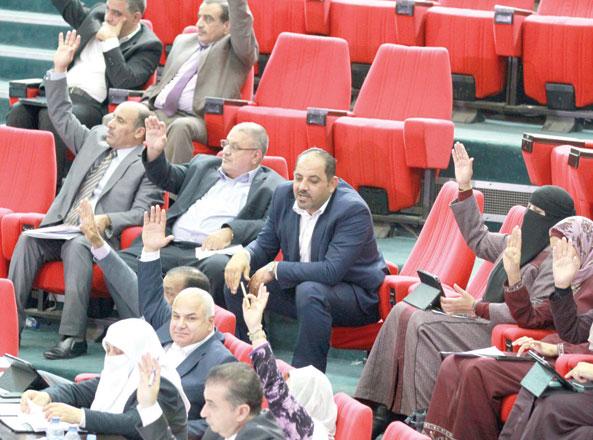You are here
Debate heats up even as income tax scenarios not final
By Raed Omari - Sep 06,2017 - Last updated at Sep 06,2017
AMMAN — Lower House Speaker Atef Tarawneh on Wednesday said that the Chamber has received no proposed amendments to the Income Tax Law from the government.
In a statement carried by the Jordan News Agency, Petra, Tarawneh said that the House would be on the side of the middle class in case it receives an amended version of the Income Tax Law that adds more financial burdens on citizens.
Tarawneh also called on the government to look for alternatives that do not affect the low-income and middle-income households, adding that the House has other suggestions to address budget deficit than resorting to "citizens' pockets"
Meanwhile, the government stressed that no final amendments to the Income Tax Law have been agreed upon, saying that the scenarios reported by some media outlets were "only some of many suggested formulas" currently under discussion.
Minister of State for Media Affairs and Government Spokesperson Mohammad Momani said Tuesday that concerned departments affiliated with the Finance Ministry are currently examining a set of proposed amendments to the law to be forwarded to a ministerial economic team chaired by Prime Minister Hani Mulki for review.
Momani told The Jordan Times Tuesday that the protection of the middle class and their welfare would be taken into consideration in any new versions of the said law.
It has been reported recently that the government was finalising new amendments to the 2014 Income Tax Law under which the tax exemption base would be expanded by lowering the threshold taxable income from JD12,000 to JD6,000 for bachelors and from JD24,000 to JD12,000 for households.
Under the current law, a 7 per cent income tax is levied on the first JD10,000 a year after the exemptions are calculated, while the percentage is doubled for the first JD20,000 above the value of the exemption. Above that limit, the tax is set at 20 per cent.
The first JD24,000 of the family income is exempted from tax, plus JD4,000 in health and education expenses that should be supported with bills.
For unmarried persons, the exemption applies to JD12,000 plus JD2,000 supported by bills.
A source familiar with the issue told The Jordan Times that there is a proposal being discussed by the government to lower the exemption value for individuals and families to JD6,000 and JD12,000 respectively.
The source added that amending the Income Tax Law is only one of the options the government has agreed upon with the International Monetary Fund (IMF) as per the economic correction programme, which aims at advancing fiscal consolidation to lower public debt and broad structural reforms to enhance the conditions for more inclusive growth.
The Income Tax Department issued a statement on Tuesday describing the news reports on amendments to the law as “rumours”, stressing that no official decision had been made yet on the next step.
An unnamed source from the department was quoted as saying that “it is still early to talk about amendments to the tax law because all options are being examined.”
Economic expert Yousef Damra said that any amendments to the Income Tax Law should be published in the Official Gazette before December 31, 2017 to constitutionally go into effect in the fiscal year 2018.
In remarks to The Jordan Times, Damra, a columnist at Al Ghad Arabic daily, said that it is important to expand the segment of citizens paying income tax, citing official figures claiming that 97 to 98 per cent of citizens are not paying income tax.
“Nobody would oppose paying income tax if the return is quality services in health, education and transportation,” Damra said.
“However,” he added, “even if the law is changed and the government generates more revenues, the problem will persist as long as the public spending mechanisms remain unchanged”.
The pundit explained that people would have no problem paying more taxes if the government proves to have a vision and well-defined plans to solve the economic woes, adding: “The government should enter dialogue with people and negotiate its plans with them the way it is negotiating with the IMF.”
Related Articles
AMMAN — Prime Minister Hani Mulki on Monday said that the government will not reduce the income exemptions to individuals or families, and w
AMMAN — Minister of State for Media Affairs and Government Spokesperson Mohammad Momani on Thursday stressed that the general tendency of th
AMMAN — The Lower House on Sunday passed the controversial 2018 Income Tax Law under parliamentary-committee amendments raising the income t












